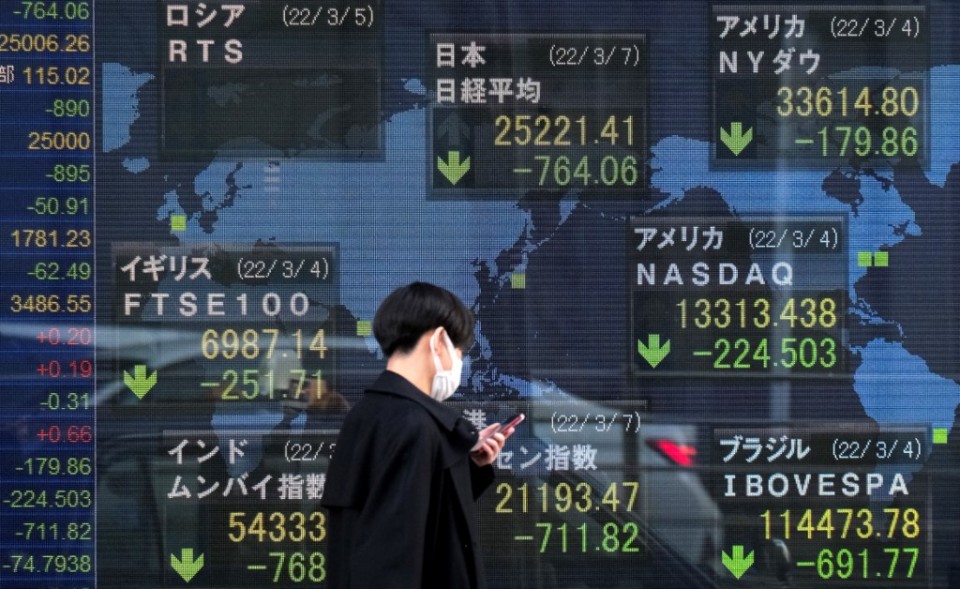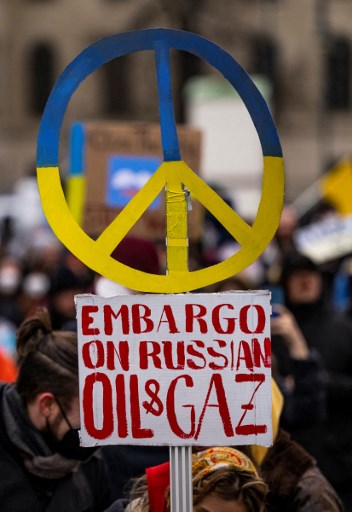
HONG KONG, China (AFP) — Equity markets plunged Monday, while oil prices soared to a near 14-year high and safe-haven gold broke $2,000 as investors grew increasingly fearful about the impact of the Ukraine war on the global economy.
Trading floors were a sea of red, while experts warned of a period of stagflation with the spike in crude likely to light a fire under already high inflation.
The commodity at one point rocketed almost 18 percent to $139.13 — a level not seen since mid-2008 — after US Secretary of State Antony Blinken said the White House and allies were in talks about banning imports from Russia.
With the country the third-biggest producer of oil, such a move would compound a supply crisis just as demand takes off. Other commodities sourced from the region such as wheat and metals were also sharply higher.
Aluminium reached $4,026.50, the first time the lightweight metal had breached $4,000 per tonne, and copper set a new record at $10,845 per tonne.
And Mike Muller of Vitol warned of further pain.
“We have plenty of twists and turns to come,” he told a podcast produced by Dubai-based consultant and publisher Gulf Intelligence.
“While I think the world is already pricing in the fact there’ll be an inability to take in a serious amount of Russian oil in the western hemisphere, I don’t think we’ve priced in everything yet.”
World governments had until now not included Russian oil in their wide-ranging sanctions on Moscow owing to concerns about the impact on prices and consumers, though trade has become increasingly tough as banks pull financing and shipping costs rise.

The surge in crude is giving central banks a headache as they start to tighten pandemic-era monetary policy to fight inflation, which is already at a 40-year high in the United States.
The International Monetary Fund warned at the weekend that the war and sanctions on Russia would have a “severe impact” on the global economy.
National Australia Bank’s Tapas Strickland said: “Global growth fears abound given the surge in commodity prices, with ‘stagflation’ again rearing its head in what must be akin to a horror movie for a central bank.
“A key question for markets is how do central banks respond to higher inflation and the possibility of slower growth ahead.”
Concerns about the impact on the global economy have rattled through markets, with European equities particularly badly hit owing to the continent’s reliance on Russian energy. The euro remained wedged below $1.10 for the first time since mid-2020.
“I suspect growth projections for 2022 around the world will need to be sharply revised lower, and it will be interesting to see what the central banks of the world will do,” said OANDA’s Jeffrey Halley.
“I believe Europe and Asia will halt thoughts of monetary policy normalisation, and with Europe on the front lines, I can’t blame them.”
And CMC Markets analyst Michael Hewson added: “With little sign that (Russian President Vladimir Putin) is inclined to back down, pushing up against the stubbornness of Ukrainian forces in acquiescing to his demands, investors are likely to find themselves tested further in the coming days, with the only certainty being more volatility.”
On Monday Asian bourses were deep in the red, with Hong Kong closing down just under four percent.
Tokyo stocks closed nearly three percent lower while Shanghai fell just over two percent.
Seoul and Mumbai fell more than two percent, with Sydney also posting losses.
News that China’s exports rose more than expected in January and February had little impact on traders.
The red spread to Europe as stocks fell at the open.
Frankfurt and Paris both briefly sank by more than five percent but recovered to show losses of just over four percent while Milan fell nearly six percent.
London was down 1.8 percent.
The panic on trading floors sent safe havens sharply higher, with gold — a key go-to in times of crisis and turmoil — hitting as much as $2,000.86, its highest since mid-2020.
The dollar was also well up against most other currencies, while Treasuries continued to rally.
– Key figures around 0810 GMT –
Brent North Sea crude: UP 9.3 percent at $129.05 per barrel
West Texas Intermediate: UP 8.5 percent at $125.5 per barrel
Tokyo – Nikkei 225: DOWN 2.9 percent at 25,221.41 (close)
Hong Kong – Hang Seng Index: DOWN 3.9 percent at 21,045.21 (close)
Shanghai – Composite: DOWN 2.2 percent at 3,372.86 (close)
London – FTSE 100: DOWN 1.82 percent at 6,859.68
Dollar/yen: UP at 114.82 yen from 114.78 yen late Friday
Euro/dollar: UP at $1.0928 from $1.0850
Pound/dollar: UP at $1.3230 from $1.3200
Euro/pound: UP at 82.60 pence from 82.18 pence
New York – Dow: DOWN 0.5 percent at 33,614.80 (close)
© Agence France-Presse








